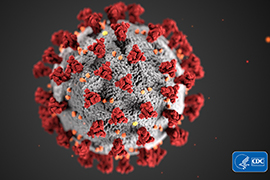- Slug: BC-CNS Coronavirus Airlines, 455 words.
- 1 photo and caption below.
By Hannah Foote
Cronkite News
LOS ANGELES – Passenger information gets checked and re-checked at airports all over the world, but when it comes to tracking COVID-19, that data has, at times, taken days to reach health officials.
The Centers for Disease Control and Prevention now requires airlines operating in the United States to collect and share personal data from passengers and crew arriving from foreign countries within 24 hours to help track any coronavirus patients.
There are 15 confirmed cases of COVID-19 within the United States and over 2,000 deaths resulting from the virus globally. With the international transmission of the virus, these health officials say airline data is important in preventing further spread of COVID-19.
The Feb. 7 rule is an effort to prevent delays – which in the past could be as long as several days – of federal health officials receiving the identifying data to “enable it to more effectively provide critical public health services,” according to the CDC. It won’t mean changes for travelers, who already provide the information to purchase flights.
When a valid phone number is collected, public health authorities say they are able to contact individuals arriving in the United States from abroad 91% of the time. With only the individual’s address, “the contact rate plummets to 44%,” based on the CDC’s experiences.
Airlines for America, a trade association that represents major U.S. airlines, stated in an email that it is working with health officials to meet the requirements within the rule.
“The safety and security of passengers and crew is – and always will be – the top priority of U.S. carriers,” the email said. “As always, we will continue to comply with all federal rules and regulations.”
Airport screening will not stop the virus from spreading, but it could slow the spread because CDC officials have the authority to order hospital admittance and home isolation for potential coronavirus patients, according to an ASU professor of public health.
Following the outbreak of the coronavirus, more than 20 airlines canceled all flights to China. Some airlines, including United Airlines and American Airlines, have extended cancelations until April.
“In order to prevent transmission, we have to figure out where that person has been and where their contacts have been,” professor Megan Jehn said. “The only way we can do that is if we have that identifying information so public health officials can follow up with infected individuals.”
Airlines for America wrote to the Trump administration Thursday with recommendations for fixing the issue of gaps in coronavirus data collection from airlines.
The rule will expire two incubation periods of COVID-19, a total of 28 days, after the last known case, or when the rule is deemed unnecessary by the head of the Department of Health and Human Services.
^__=
COVID-19 is a respiratory virus that was first detected late last year in Wuhan, an industrial city of 11 million in eastern China. So far, more than 2,200 people have died, mostly in China. (Photo courtesy of Centers for Disease Control and Prevention)
